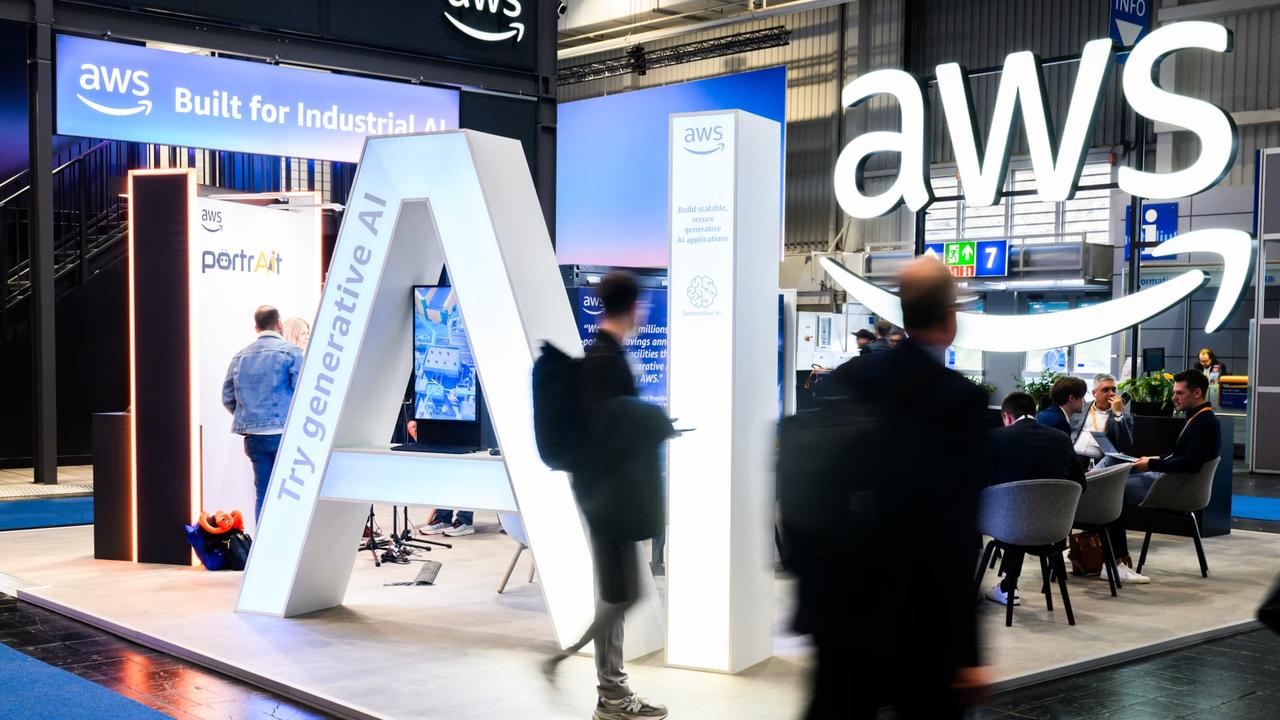AWS Unveils Custom Cooling System for AI Chips, Challenging Vertiv's Market Position
2 Sources
2 Sources
[1]
AWS just crushed Vertiv? Stock tanks over 6% after Amazon's bold cooling move
Vertiv Holdings stock declined following Amazon Web Services' announcement. AWS introduced its cooling hardware for Nvidia's AI chips. This move challenges Vertiv's liquid cooling solutions for data centers. Analysts express concern about Vertiv's growth. AWS's new In-Row Heat Exchanger system cools high-performance AI chips. The system was developed with Nvidia in just 11 months. It combines liquid and air-based cooling. Vertiv Holdings stocks dropped more than 6% on Thursday, reeling from a surprise announcement by Amazon Web Services that could directly threaten one of Vertiv's key revenue streams, as per a report. The drop followed AWS's unveiling of its own custom cooling hardware designed to support Nvidia's next-gen AI chips -- technology that overlaps significantly with Vertiv's offerings, as it provides liquid cooling solutions for data centers, according to an Investing.com report. GuruFocus reported that according to the one-year price targets provided by 20 analysts, the average target price for Vertiv stock is $120.56, with a high estimate of $150.00 and a low estimate of $82.00. The cause of the shakeup is AWS's new In-Row Heat Exchanger (IRHX), a homegrown cooling system built to handle the extreme heat output of Nvidia's Blackwell GPUs, as per the report. These cutting-edge chips are driving a new wave of AI computing, but their power demands have created a significant thermal challenge for data center operators, according to Investing.com. Until now, companies like Vertiv have been key players in addressing those needs through advanced liquid cooling systems, as per the report. But AWS, one of the biggest cloud providers and potentially one of Vertiv's top customers, just announced it's taking matters into its own hands, according to the report. Developed in collaboration with Nvidia, the IRHX system went from design to production in just 11 months, according to the report. It uses a hybrid approach, combining liquid cooling through cold plates directly on GPU chips with air-based components that help remove heat through fan-coil arrays, and is expected to deliver high-performance cooling without the space or water usage of traditional methods, as reported by Investing.com. AWS vice president Dave Brown noted that standard cooling techniques "would take up too much data center floor space or increase water usage substantially," as quoted in the report. Bloomberg Intelligence analyst Mustafa Okur highlighted the potential impact on Vertiv, saying, "Amazon Web Services rolling out its own server liquid-cooling system could weigh on Vertiv's future growth prospects. Around 10% of overall sales come from liquid cooling, we calculate, and AWS may be one of the largest customers," as quoted by the Investing.com report. The timing of the announcement coincides with AWS rolling out new AI computing instances featuring Nvidia's latest chips, all supported by its custom-built Nitro infrastructure for performance monitoring and networking, according to the Investing.com report. Why did Vertiv's stock drop this week? Because AWS revealed it built its own cooling tech for AI servers -- potentially cutting into Vertiv's business. What is AWS's new cooling system? It's called the In-Row Heat Exchanger (IRHX), and it cools high-performance AI chips like Nvidia's Blackwell GPUs, as per the Investing.com report.
[2]
Why Vertiv Stock Was Pulling Back Today | The Motley Fool
Vertiv has been a big winner from the data center boom so it's not surprising to see Amazon trying to muscle in on its territory. In a blog post yesterday, Amazon touted an advance in liquid cooling for its P6e-GB200 Ultra Servers, an improvement from previous air cooling. That technique allows for higher compute density, which will make it easier for its customers to get up and running with Nvidia Blackwell GPUs on Amazon Web Services (AWS). Last month, Amazon announced it had developed a new custom liquid cooling system in just 11 months, and it now seems to be deploying that technology as yesterday's announcement indicates. Amazon also said that the company had considered multiple liquid cooling solutions from other vendors, but realized they weren't a good fit for AWS. That was not a direct comment on Vertiv, but investors may be interpreting it that way. It's unclear if Amazon plans to sell the technology, but just using it for AWS would be enough to make waves in the data center market. AWS is still the biggest cloud infrastructure provider, meaning it has the greatest demand for computing power. The implication for Vertiv isn't clear at this point, but the stock is up roughly 10 times from where it was in 2022 before the artificial intelligence (AI) boom started. It's been seen as one of the most direct winners from AI, and is seeing strong growth with 25% organic net sales growth in the first quarter. For the near term, Vertiv's prospects look solid, but Amazon could look to challenge it in other ways as well, which could present greater problems for the growth story.
Share
Share
Copy Link
Amazon Web Services (AWS) has introduced its own cooling hardware for Nvidia's AI chips, potentially disrupting Vertiv's position in the data center cooling market. This move has led to a significant drop in Vertiv's stock price.
AWS Introduces Custom Cooling System for AI Chips
Amazon Web Services (AWS) has unveiled a groundbreaking cooling system designed specifically for high-performance AI chips, sending ripples through the data center technology market. The announcement has led to a significant drop in Vertiv Holdings' stock price, as the new system directly challenges Vertiv's liquid cooling solutions for data centers
1
.
Source: ET
The In-Row Heat Exchanger (IRHX) System
AWS's new cooling solution, called the In-Row Heat Exchanger (IRHX), was developed in collaboration with Nvidia in just 11 months. The system is tailored to handle the extreme heat output of Nvidia's next-generation Blackwell GPUs, which are driving the latest wave of AI computing
1
.The IRHX employs a hybrid approach, combining:
- Liquid cooling through cold plates directly on GPU chips
- Air-based components that help remove heat through fan-coil arrays
This innovative design is expected to deliver high-performance cooling without the extensive space or water usage typically associated with traditional methods
1
.Impact on Vertiv and the Market
The announcement has had an immediate impact on Vertiv Holdings, with its stock dropping more than 6% following the news
1
. Analysts have expressed concern about Vertiv's future growth prospects, given that AWS may be one of its largest customers1
.Bloomberg Intelligence analyst Mustafa Okur highlighted the potential impact, stating, "Around 10% of overall sales come from liquid cooling, we calculate, and AWS may be one of the largest customers"
1
.Related Stories
AWS's Strategic Move
AWS's decision to develop its own cooling system came after considering multiple liquid cooling solutions from other vendors. The company determined that existing options weren't a good fit for its specific needs
2
.Dave Brown, AWS vice president, explained the rationale behind the move, saying, "Standard cooling techniques would take up too much data center floor space or increase water usage substantially"
1
.
Source: Motley Fool
Market Implications and Future Outlook
While the full implications of AWS's move are yet to be determined, it represents a significant shift in the data center cooling market. Vertiv has been a major beneficiary of the AI-driven data center boom, with its stock price increasing tenfold since 2022
2
.For the near term, Vertiv's prospects remain solid, with the company reporting 25% organic net sales growth in the first quarter
2
. However, AWS's entry into the cooling technology space could present challenges to Vertiv's growth story in the long run.The timing of AWS's announcement coincides with the rollout of new AI computing instances featuring Nvidia's latest chips, all supported by its custom-built Nitro infrastructure for performance monitoring and networking
1
.As the AI industry continues to evolve rapidly, this development underscores the increasing importance of efficient cooling solutions in supporting the next generation of high-performance computing infrastructure.
References
Summarized by
Navi
[2]
Related Stories
Recent Highlights
1
Pentagon threatens to cut Anthropic's $200M contract over AI safety restrictions in military ops
Policy and Regulation

2
ByteDance's Seedance 2.0 AI video generator triggers copyright infringement battle with Hollywood
Policy and Regulation

3
OpenAI closes in on $100 billion funding round with $850 billion valuation as spending plans shift
Business and Economy








